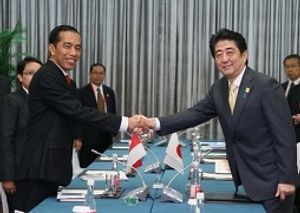On February 3, Indonesian media reported that Indonesia’s ambassador to Japan Yusron Ihza Mahendra had said that the two sides would sign a defense partnership soon.
According to Yusron, the two sides will ink a memorandum of understanding (MoU) covering defense with a particular focus on the transfer of Japanese-manufactured equipment to Indonesia as well as “joint research and production” between the two countries’ defense industries. Though he did not confirm when the agreement would be signed, he said he expected it to be concluded when Indonesian president Joko “Jokowi” Widodo visits Japan around March.
While details are still unclear, the defense partnership would be in line with the needs of both sides. As I have pointed out previously, Indonesia is looking to build up its defense industry as it upgrades its military capabilities. Partnerships with other countries is one way that state-owned firms involved in the industry can get access to skills, knowledge and practices. It is no coincidence, for instance, that the example of defense collaboration Yusron reportedly mentioned was “joint cooperation in research, production and capital” involving Indonesian aerospace firm PT Dirgantara Indonesia.
Japan has also been increasingly active in trying to gradually expand defense relationships with Southeast Asian countries, particularly since it eased some restrictions on its arms export ban in April last year. As I noted back in 2013, this is part of Tokyo’s broader ‘charm offensive’ targeted at ASEAN states since Japanese Prime Minister Shinzo Abe took office in December 2012. Much of the attention thus far has focused on the patrol boats Japan has publicly offered to the Philippines and Vietnam. But we could also see further developments taking place in 2015, with informal discussions taking place between ASEAN and Japan about Tokyo providing equipment and technology for regional security up to the ministerial level last year. The recent initiatives that came out of defense talks between Japan and the Philippines, which I reported on here, are just a glimpse of what we might expect.
A MoU would also build on existing cooperation between both sides on the defense and security issues. Preliminary discussions held in early 2013 under Jokowi’s predecessor Susilo Bambang Yudhoyono following Abe’s ascent to power addressed five key areas: the defense industry, education and training, counterterrorism, disaster relief management and human resources. In addition, initial engagements during Jokowi’s tenure thus far have also featured a focus on maritime infrastructure – in line with his vision of a global maritime fulcrum – as well as maritime security given Indonesia’s involvement in the South China Sea issue, albeit as an interested party rather than a claimant. There have also already been discussions about Japan potentially supplying patrol boats to Indonesia.
Given all this, the exact content of the eventual agreement itself will be interesting to watch, and all eyes will be on Jokowi when he embarks on his scheduled visit to Japan later this year.
































